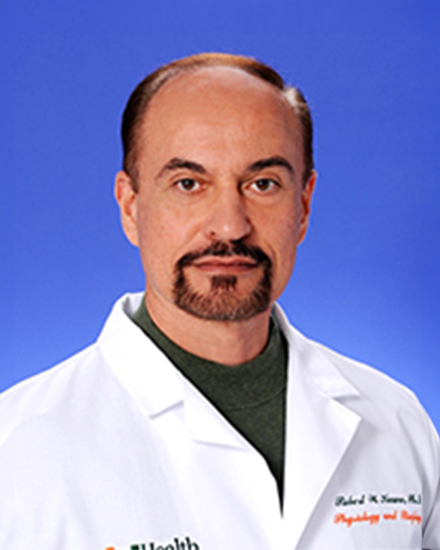Roles
Professor of Physiology and Biophysics
-
Biography
Dr. Keane is Professor of Physiology and Biophysics, Neurological Surgery and Microbiology and Immunology at the University of Miami, Miller School of Medicine. Over the last 30 years his research has focused on understanding the innate immune response in the central nervous system. Dr. Keane discovered that inflammasomes are expressed in neurons and play a role in the inflammatory response after central nervous system injury. His laboratory has demonstrated that the adaptor component of the inflammasome know as ASC plays a critical role in inflammasome activation in a variety of neurodegenerative conditions and diseases. He received a fast-track STTR grant from the National Institutes of Health to develop a biologic to block ASC called IC 100 that may be used to treat central nervous system injury and neurodegenerative diseases. He has published extensively in the fields of neuroinflammation and neuroimmunology. He is a founding member of InflamaCORE, LLC, a company dedicated to treating and diagnosing inflammatory injury and disease. Dr. Keane received his bachelor’s degree in biology from SUNY, College at Buffalo and his MS and Ph.D. degree in Genetics from the University of California, Davis. From 1976-1980 he completed a postdoctoral fellowship in Molecular Biology and Neuroscience at the Massachusetts Institute of Technology and he received a postdoctoral fellowship award from the Leukemia Society of America. -
Teaching Interests
I have been actively involved in medical school and graduate teaching for over 39 years. I served as course director for the Neuroscience and Behavioral Science Module for 35 years and initiated the first Developmental Neuroscience course for the Neuroscience Program. Highlighted below are my teaching activities.
Medical teaching:
Neuroscience and Behavior Module MDR 506 Course Coordinator 2001-2019
Organized lectures, developed small groups, oversee organization of clinical presentations, responsible for preparing quizzes, exams and grading. Introduced and presented new lectures on neurodegeneration and cell death, stress and the hypothalamus-pituitary-adrenal axis, and physiology of hearing. Introduced 10 new clinical presentations in which patients with neurological defects or disease are presented.
Neuroscience and Behavior Module MDR 558 Course Coordinator 2012-2019
MD/MPH Program
Organized lectures, developed small groups, oversee organization of clinical presentations, responsible for preparing quizzes, exams and grading.
Psychiatry Resident Training 2007
Medical teaching to Psychiatry residents
One-hour lecture on Stress and the hypothalamic-pituitary-adrenal axis
One-hour lecture on Neurodegeneration
PHS 511 Neurophysiology Course Coordinator 1982-2000
Introduced new lectures on brain imaging, higher cortical functions, pain and central nervous system metabolism. Developed innovative laboratory on pain for first year medical students, and introduced demonstration of diagnostics of otolaryngology techniques as measurement of tympanogram and acoustic brain stem reflexes. Developed problem-based learning in ophthalmology for first year medical students that reinforces basic neurophysiology of the visual system.
PHS 510 Cellular Physiology and Membrane Biophysics 1982-2003
2008
1.5 hours of lecture on membrane structure and function
1.5 hours of lecture on membrane transport
4 small group conferences on membrane properties, resting and action potentials and muscle physiology
Neurophysiology and Cellular Biophysics Course Coordinator 1982-1987
Ph.D./M.D. Program
Organized all aspects of this course for Ph.D./M.D. program
Graduate Teaching:
NEU 601 Introduction of Neuroscience Research Techniques 2002-2010
Graduate course
8 hours of experiments on immunoblotting technique
NEU 662 Developmental Neuroscience 1987-present
Graduate Course
Two-hour lecture on Neurodegeneration
Two hours of small group discussion
MDB501 Molecular and Cellular Biology 2001-2010
Graduate Course
One-hour lecture on apoptosis
CBA 652 Developmental Biology 2000-present
Graduate Course
Lecture on apoptosis and cell death -
Research Interests
Over the past 15 years, my research has focused on the initiation of inflammation in the CNS after injury, with particular emphasis on inflammatory processes regulated by the innate immune system. Our work has shown that secondary inflammatory processes after CNS injury are regulated by inflammasomes. We were to first group to demonstrate that spinal cord neurons express the NALP1 inflammasome consisting of caspase-1, caspase-11, ASC and NALP1, and form a protein assembly with the inhibitor of apoptosis family member, XIAP. This study was the first characterization of the NALP1 inflammasome in vivo and demonstrates that neurons constitute an important arm of the innate CNS inflammatory response. Importantly, therapeutic neutralization of ASC inhibited the inflammasome, reduced caspase-1 activation, XIAP cleavage, and processing of proinflammatory interleukins, resulting in significant tissue sparing and improved functional recovery. Thus, the NALP1 inflammasome constitutes an important arm of the innate CNS inflammatory response following SCI and this therapeutic strategy may constitute a potent treatment for spinal cord injury in humans. More recently we found that innate immune proteins are secreted in exosomes in TBI and SCI patients. Our current efforts are directed to understanding pathomechanisms medicated by exosome signaling after CNS injury and the role of ASC specks in neurodegenerative diseases.
One of my main research goals is to identify therapeutic targets for the treatment of innate immune inflammation after CNS injury and disease, and to translate these findings clinically. Moreover, I have co-founded a startup biotechnology company, InflamaCORE, LLC that is dedicated to treating and diagnosing inflammatory injury and disease. At InflamaCORE we are currently developing an anti-inflammatory drug to treat inflammation after spinal cord injury and neurodegenerative diseases, which we intend to take to clinical trials. InflamaCORE has already secured initial funding through a STTR business grant, and have licensed several patents to other Biotech companies for further development. -
Publications
Disclaimer: The information presented in this section has been consolidated using AI and machine learning technologies. While every effort has been made to ensure accuracy, errors may occur. If you identify any inaccuracies, please use this link to inform our data team. Your feedback is greatly appreciated and helps us improve the quality of our content.


